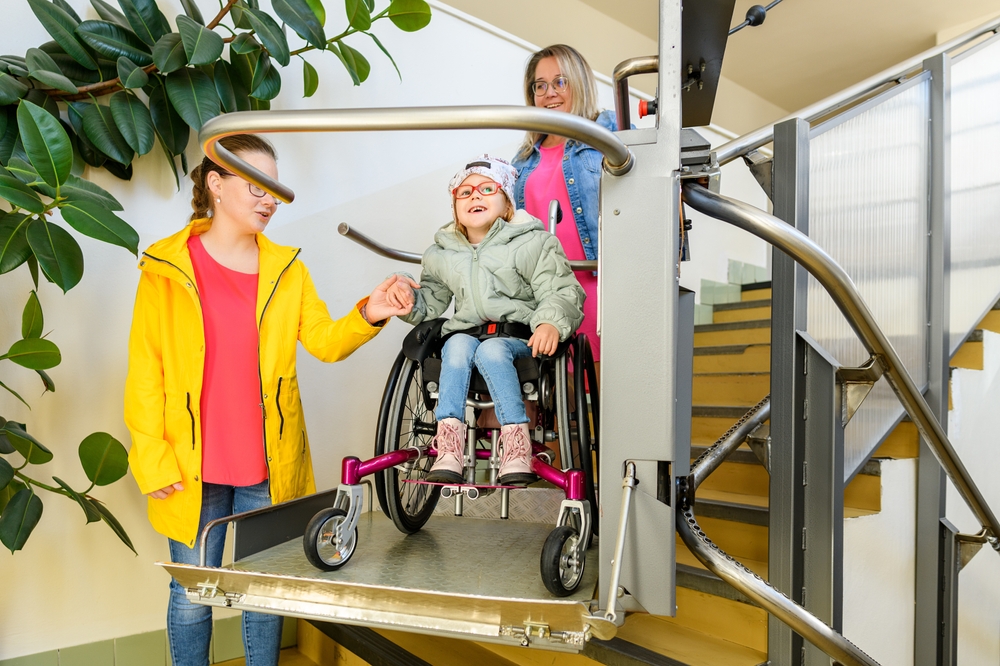Caring for a child with a chronic illness such as cerebral palsy (CP) can be an overwhelming challenge. Your child’s doctor and therapist will help with a lot of their treatment, but there are still many things you can do to improve the quality of life for your child.
This article provides practical tips to help parents and caregivers manage the care of a child with CP effectively, ensuring they receive the best possible support.
Tips for Medical Support When Caring for Children with Cerebral Palsy
A strong foundation of pediatric medical and professional support is essential for providing the best care for a child with cerebral palsy. Here are some important tips:
1. Contact Early Intervention Programs for Support
Early intervention is vital in supporting a child with cerebral palsy and helping their long-term development. These programs offer free physical therapy, occupational therapy, and speech therapy to babies and young children until the age of 3. If your child is 3+ years of age, speak to the school or your pediatrician to find available services.
2. Explore Various Therapy Options
Therapies such as physical therapy (improving motor skills and mobility), occupational therapy (enhancing daily living activities), and speech-language pathology (developing communication challenges) are essential for children with cerebral palsy. These therapies can greatly enhance your child’s quality of life, fostering independence and confidence.
3. Consistently Coordinate with Therapists
Collaboration between you and your child’s therapists ensures that all aspects of your child’s care are aligned. Regular communication helps to track progress, adjust treatment plans, and address any new challenges promptly.
4. Find a Trustworthy CP Specialist
A CP specialist, such as a pediatric neurologist or physiatrist, is essential for managing your child’s medical needs. Look for a specialist with experience in treating Cerebral Palsy who provides comprehensive care, including monitoring growth, managing medications, and addressing complications specific to your child.
5. Become Educated on Cerebral Palsy
Learn about your child’s condition, including its causes, symptoms, and treatment options. Staying informed helps you make better decisions about your child’s care and advocate for their needs.
6. Stay Organized and Keep Detailed Medical Records
Managing your child’s cerebral palsy often involves coordinating multiple appointments, therapies, and medications. Keep detailed records of medical history, therapy progress, medication schedules, and any special instructions or observations. Utilizing apps or portals can also help you stay organized and ensure that all aspects of your child’s care are consistently managed.
7. Monitor Your Child’s Health
Pay attention to any changes related to your child’s cerebral palsy, like new symptoms or shifts in mobility. Early detection of health issues leads to timely intervention, preventing complications and ensuring your child’s well-being.
8. Look Into Financial Assistance Programs
Check what financial assistance is available for children with cerebral palsy through programs like Medicaid, Social Security, and state-specific services. These programs can help cover the costs of therapies, medical equipment, and other necessary care.
Tips on Daily Living and Rehabilitation When Caring For Children with Cerebral Palsy
Here’s how you can create a supportive environment that promotes your child’s independence and overall well-being on a daily basis:
1. Continue Therapy at Home
Continuing therapy at home reinforces your child’s progress. Work with your child’s therapists to learn exercises and activities that can be done at home and help maintain and accelerate your child’s progress.
2. Promote Physical Movement and Exercise
Encourage your child to engage in regular exercise tailored to their abilities, like swimming, yoga, or stretching exercises to help prevent muscle stiffness and improve mobility.
3. Keep Your Child Mentally Stimulated
Mental stimulation is as important as physical activity. Engage your child in activities that challenge their mind, such as puzzles, reading, or educational games.
4. Encourage Socialization
Arrange playdates, enroll your child in community programs, or participate in adaptive sports. Socializing can help your child build friendships, develop social skills, and feel connected to their peers.
5. Create a Nutritious Diet
Consider working with a nutritionist to create a diet plan that meets your child’s specific needs, focusing on foods that provide the necessary nutrients for growth and energy. Proper nutrition also helps manage digestive issues common in children with CP.
6. Look into Assistive Devices
There are many tools to help your child navigate daily activities more easily. Consult with your child’s therapist or specialist to find the most appropriate assistive devices for their needs.
Tips on Education and Development When Caring for Children with Cerebral Palsy
Here are some tips to help you navigate the educational landscape:
1. Prepare for School
Work together with your child’s school to ensure the environment is accessible and accommodating to your child’s physical and learning needs. This could include arranging for special equipment, modifying classroom layouts, or providing additional support during school hours.
2. Develop Individualized Education Programs (IEPs)
Work closely with the school’s IEP team to develop a plan that includes specific goals, accommodations, and support services. Regularly review and update the IEP to ensure it continues to meet your child’s evolving needs.
Tips for Emotional and Social Support
The emotional and social well-being of both your child and your family are essential components of effective care.
1. Stay Positive and Supportive
Your attitude significantly influences your child’s emotional well-being. Maintaining a positive outlook, even during challenging times, helps your child feel confident and secure. Celebrate achievements and provide encouragement as they navigate their challenges.
2. Seek Help from Family and Friends
Don’t hesitate to reach out to family and friends for help with daily tasks or emotional support. Building a strong support network can make a significant difference in your caregiving journey.
3. Join Support Groups
Support groups offer a sense of community and understanding that is invaluable for families dealing with cerebral palsy. These groups provide a space to share experiences, exchange advice, and offer mutual support.
4. Make Time for Yourself
It’s essential to take care of your own well-being while caring for a child with cerebral palsy. Regularly schedule time for the things that keep you mentally and physically healthy so you can continue to provide the best care for your child.
5. Engage in Social and Recreational Activities
Taking time for fun, and social activities outside of the home can help break up your daily routine and reset your energy levels.
6. Consider Childcare Options
If the demands of caregiving become overwhelming, consider professional childcare services. Respite care, in-home care, or specialized daycare programs provide temporary relief, allowing you to recharge while ensuring your child receives quality care.
When to Consider Professional Home Health Care
As your child’s needs evolve, professional home health care may become necessary. This level of care provides medical support, therapeutic services, and assistance with daily activities. Professional caregivers offer specialized expertise and resources that may be beyond the capabilities of family caregivers.
How Americare Can Help
Every day, Americare helps children living in New York with chronic conditions like cerebral palsy, to navigate their journeys and get the services and home care they need to increase their quality of life. Our team of experienced home health aides, skilled nurses and pediatric home health therapists are here to support your family and get your child the best care possible.
Contact Americare today to learn more about how to find the best care for your child.


